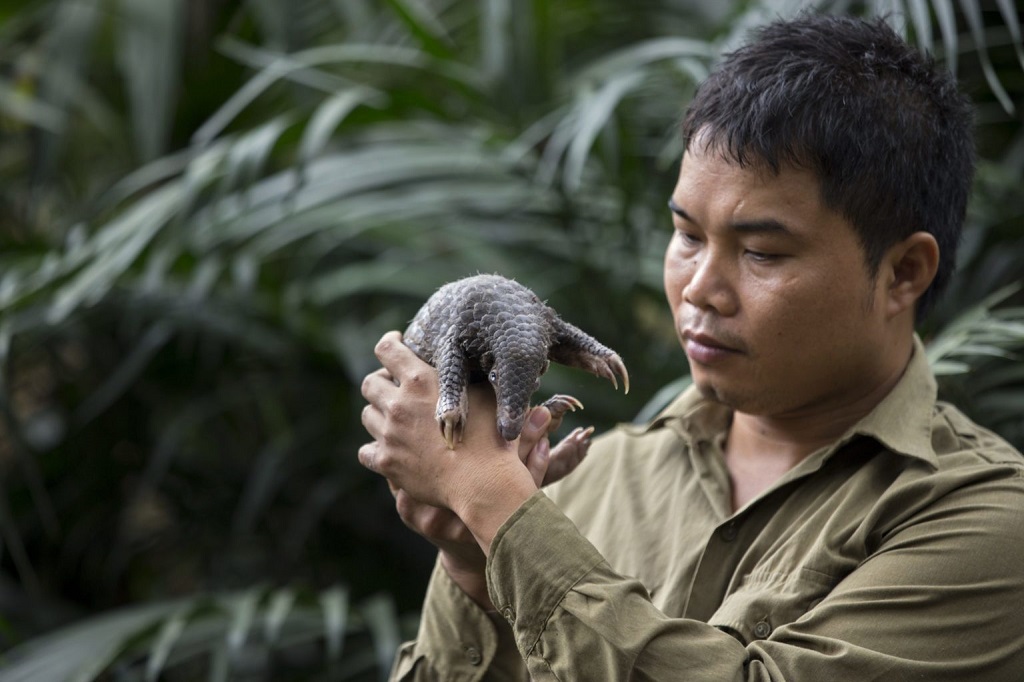Oh no! You wake up and find that your house has been invaded by thousands of tiny ants. Worse, the worker that often helps you trap and kill ants is on a vacation! The only option for this situation is calling Mr Pangolin that lives in the forest nearby. But there is one problem. You are scared of his appearance, thinking that he will hurt you with those scary-looking scales. On the other hand, Mr Pangolin is eager to lap up those annoying ants and save your house from them. He is that unsung hero that is often misunderstood. Sadly, he is a member of a species that is believed to be trafficked the most on planet Earth. In this article, I will give insight into this mysterious species and why they are still illegally poached.
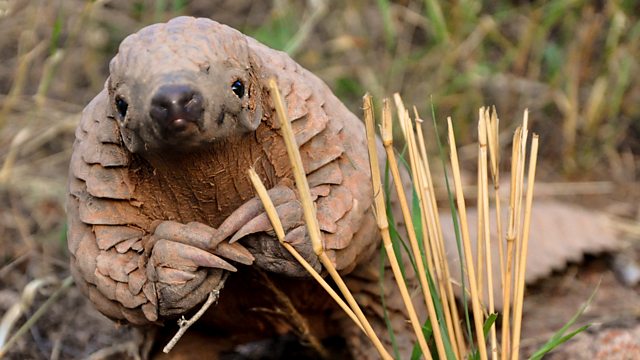
An Insight Into Pangolins
The origin of the word “pangolin” comes from “penggulung” – the Malay world for roller (the pangolin species’ most notable traits). When they are attacked, they roll into a ball and release a stinky fluid from the base of their tails to defend themselves. Scales are known as pangolins’ “shields”. A threatened pangolin will cover its head with its forelegs, exposing its shields to ward off any potential predator. Despite looking and acting like anteaters and armadillos, they are closely related to animals with furs like bears, dogs, and cats. Pangolins are misidentified as reptiles, but they are actually scaly-skinned mammals. Surprisingly, they are the only mammals that are covered in scales. The species’ scales also make up 20 per cent of its overall body weight, and they are so hard that even lions cannot bite through them! Its scales are made of keratin – the same protein that makes up our hair, nails, and horns. Therefore, like rhino horns, pangolin scales have no proven medicinal value.
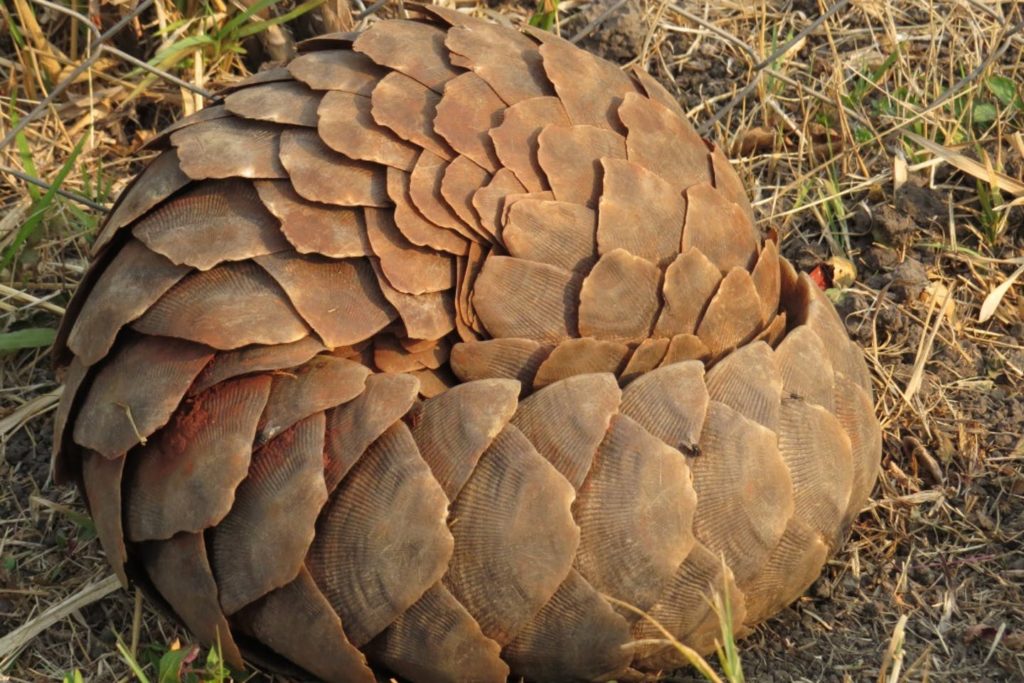
Photo Credits: Save Pangolins
A Full Stomach Is Always Important
Pangolins are insectivores, meaning that their diet comprises ants and termites. These scaly creatures are also said to be avid eaters. Despite having no teeth, pangolins can consume up to 20,000 prey a day. They compensate for their lack of teeth by digging into the soil and hunting insects with their long, sticky tongues and curved claws. You may wonder how this animal digest food without the help of teeth. Interestingly, pangolin stomachs evolved into gizzard-like structures with protruding and pointy walls that crush and break down their food. To aid digestion, pangolins consume small rocks and sand. In spite of their poor vision, pangolins still can search for ants by putting their nostrils – their impeccable sense of smell into good use. Scales are not the only parts of their defence system. Pangolins have special muscles that close their nostrils and ears, preventing them from being attacked by insects. These muscles also keep ants and termites from escaping.
Being Introverted Is A Gift
Pangolins are nocturnal, solitary, and secretive animals. Most live and move on the ground, but some, such as black-bellied pangolins, are also excellent tree climbers. They emerge during nighttime to search for insects. Naturally shy, pangolins find joy in spending time alone in deep burrows. For instance, Chinese pangolins in temperate climates spend the winter in deep burrows, hiding from the outside world. Pangolin’s shy disposition, however, does not detract from their cleverness and inquisitiveness. Their personal spaces are excavated near termite nests which provide an abundant food source. Another fascinating fact is that pangolins are believed to be globetrotters. They are said to travel around the world underground in Chinese legend.

We, Pangolins, Are A Large Family
There are eight species of pangolins. They consist of Asian pangolins (Chinese, Sunda, Indian, and Philippine) and the white-bellied pangolin, black-bellied pangolin, giant pangolin, and Temminck’s pangolin – which are indigenous to Africa. Although there is paleo-archaeological evidence that suggests pangolins may have evolved in Europe, extant pangolins are found only in Asia and Africa.
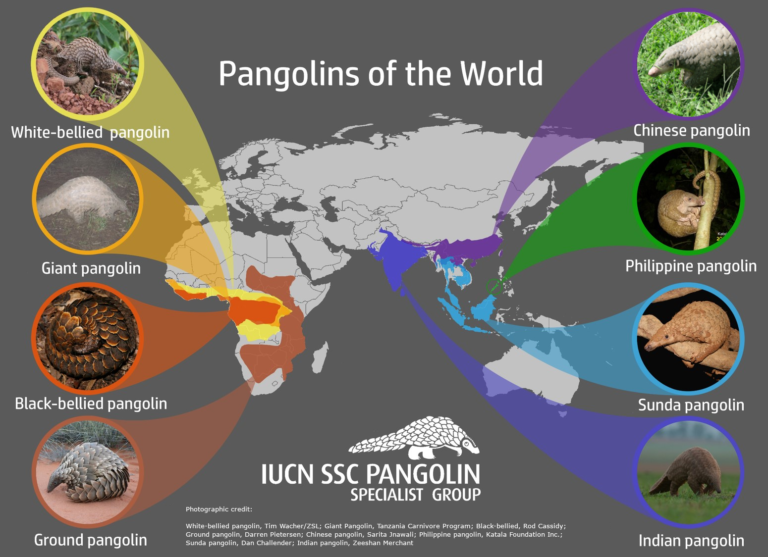
Pangolins can be found in various habitats, from forests and grasslands, tropical regions to dense brush. They generally live where there are large numbers of insects to feed their voracious appetite for insects. The ones that live on the ground prefer to sleep and nest in dig deep holes or tunnels. Some chambers are even big enough for humans to crawl into and stand up! Some pangolin species, such as the Sunda ones, also sleep in hollows, tree forks, and logs. Since pangolins are active at night, they spend their days sleeping and getting cosy.
Mysterious as they are, pangolins are not afraid to be themselves. They take pleasure and delight in living in their own world.
Love In The Pangolin World
Pangolins are known to be solitary; therefore, they do not live in families and groups. The only time they interact with one another is when they mate and give birth. There is no specific mating season, but most animals usually mate once a year in the summer or autumn, which can be the same case with pangolins. Normally, male pangolins seek to attract the female ones first. To find “the love of their lives”, males mark their presence with urine or faeces (solid waste discharged from an animal’s body through the bowels), allowing females to detect them using their strong sense of smell. If there are several males in the same area as a female, they will fight over her with their tails. Pangolin fathers will remain in the den until the single offspring is self-sufficient.
The female gives birth to a single baby after 140 days. In the beginning, they are vulnerable to predators because of their soft and white scales. To protect their children during this state, mothers take care of pangolin infants in their burrows and curl into a ball around them if there is danger. The scales harden and turn brown like an adult after a few days, but the young will stay on their mothers’ tails until they are accustomed to taking food on their own. Pangolin mothers continue to nurse their babies and then abandon them once they reach two years of age. Pangolins are also sexually mature at that age and are able to reproduce.
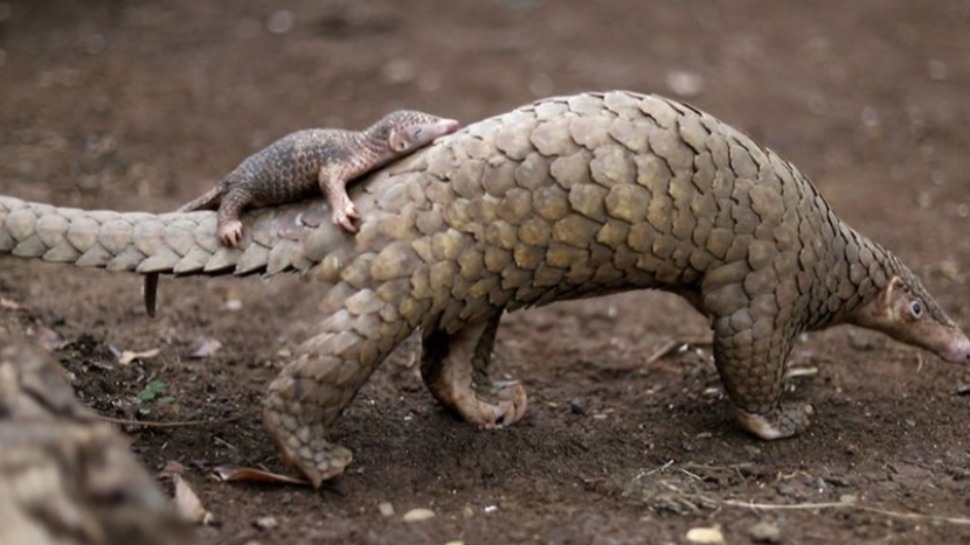
Photo Credits: Esquire Philippines
The Current Status Of Pangolins
Unfortunately, this shy, harmless, and adorable species is threatened by profit-driven poachers and traders. In fact, it is believed to be the world’s most trafficked non-human mammal. Tens of thousands of pangolins are trafficked and killed each year to satisfy the ultra-rich in countries such as China and Vietnam, where pangolin meat is considered a delicacy. There are eight pangolin species in total, and they are being slaughtered and poached at an alarming rate. They are slashed repeatedly with knives and metal rods until they lose consciousness. Right after that, they are thrown into pots of boiling water, which are not different from pots of hell, to make an infamous dish known as pangolin fetus soup. Worse, they are sometimes brought to the table alive, only to be brutally killed and cooked right before meals!
Despite the fact that pangolin scales have no proven “magical” medicinal value, they are still highly demanded. They are still believed to help treat and cure ailments ranging from lactation problems to arthritis. Consequently, pangolins are poached and trafficked every year to supply traditional medicine needs in countries like China, Hong Kong, and Vietnam. The scales are usually dried up and ground into powder, which is then turned into a pill. This endangered species is also used in rituals among communities across Africa and Asia.
Due to overexploitation, populations of Asian pangolins have declined dramatically (approximately 90 per cent decline of Chinese pangolin since the 1960s). Poachers and traffickers are turning to their African counterparts, wiping out 0.4 to 2.7 million pangolins in Central Africa annually. According to Sarah Stoner – the Wildlife Justice Commission’s director of intelligence, Nigeria has been a global hotspot for pangolins exports, accounting for 55 per cent of seizures between 2016 and 2019.
Traffickers use various cunning schemes to carry out illegal trade and shipment. According to UNODC, illicit trafficking is often done by sea, air and land, with parcel trade occuring on occasion. Pangolins are smuggled along with legal products via hidden trails or official routes. Consignments of scales are hidden beneath frozen meat and ice, and “cover loads” such as plastic waste, wood chips, or foodstuffs. Ivory traffickers are now involved in the pangolin scale trade network, often transporting ivory and pangolin scales together. Wildlife criminals who formerly participated in trafficking ivory are suspected to have profited from pangolins now that China banned domestic ivory trades since 2018.
Although many countries have enforced laws to protect pangolins and the Convention on International Trade in Endangered Species (CITES) banned international commercial trade in pangolins in 2016, almost a million pangolins have been trafficked during the past decade. If this number does not seem convincing enough, an incidence in Hong Kong will prove you otherwise. In 2016, Hong Kong authorities seized 4.4 tons of African pangolin scales belonging to in cargo labelled “sliced plastics” from Cameroon. As reported by the International Union for the Conservation of Nature (IUCN), the haul was estimated to be worth $1.25 million and included between 1,000 and 6,600 pangolins. In April 2019, Singapore seized a 14-ton shipment of pangolin scales equivalent to about 72,000 pangolins arriving from Nigeria. In the same year, 123 tons of pangolins scales were confiscated by Chinese customs and officials. It is clear that poachers are turning to African pangolins as the number of pangolins in Asia has diminished.
The exact number of the remaining pangolins remains a question, but all eight pangolin species are listed as endangered or threatened by extinction by IUCN. As if threatens coming from notorious traffickers were not enough, pangolins also have to deal with habitat loss and a low reproductive rate: Female pangolins produce only one baby a year.
Pangolins In Vietnam
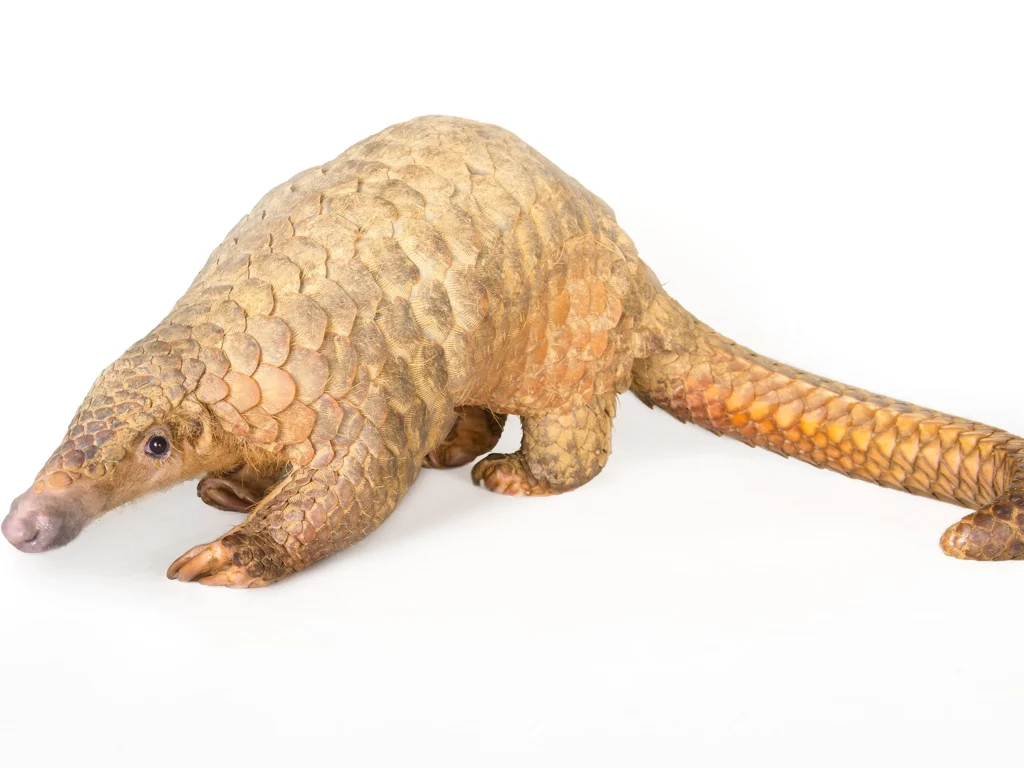
An endangered Sunda pangolin at the Carnivore and Pangolin Conservation Center in Cuc Phuong National Park, Vietnam.
Photo Credits: Joel Sartore, National Geographic
Vietnam is famous for its biodiversity and breathtaking nature. It is also home to two species of pangolins, the Chinese pangolin and the Sunda pangolin. These two species are important to Vietnam, being fully protected under national wildlife protection laws, notably decree 06 (2019) and decree 64 (2019). In Vietnam, it is illegal to hunt, trap, possess, trap, kill, or trade pangolins. Penalties for breaking the law are harsh, with 15 years in prison and fines up to VND15 billion, equivalent to around $645,000. Despite being a priority for conservation, the pangolin species in Vietnam is still under great danger. As reported by Education for Nature – Vietnam (ENV), the demands for pangolin meat and scales in Vietnam are high. They are commonly served as a “speciality food” at restaurants, and their scales are highly valued in traditional medicine. There are wide-ranging trade networks, in which live pangolins are hunted in mainland Vietnamese forests or smuggled from Laos and Cambodia at the borders of central provinces such as Ha Tinh.
As Asian pangolin populations are declining, scales and frozen meat from African pangolins are increasingly trafficked and consumed within Vietnam. A direct illicit trafficking route between Vietnam and Nigeria was first discovered in 2018 and has continued since then, making Vietnam a primary destination for African pangolins. Vietnam also serves as a stopover for pangolins traded throughout Africa and Asia. Hai Phong City, situated in northern Vietnam, is a major seaport where scales are frequently smuggled into the country before being trafficked to China. On May 19th in 2021, the Police Department on Preventing Environmental crimes and the Office of Police Investigation in Hanoi have seized a total of 948 kilograms of white-bellied pangolin scales. This is the largest network of transporting and trading pangolin scales across the country. Last but not least, Vietnam, along with China, Hong Kong, Singapore, Nigeria, and the Democratic Republic of Congo, were responsible for 94 per cent of all contraband impounded between 2016 and 2019.
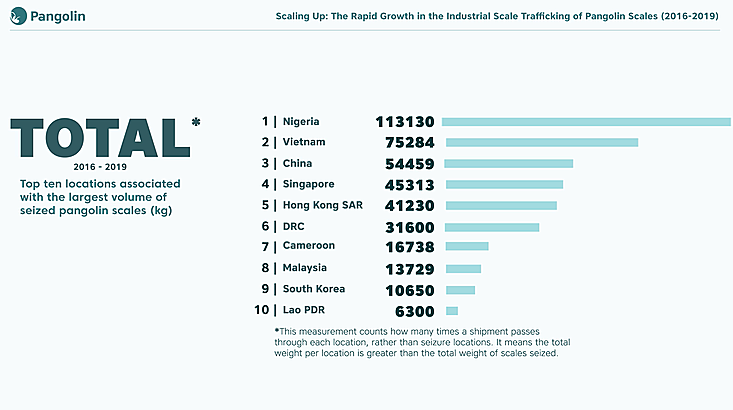
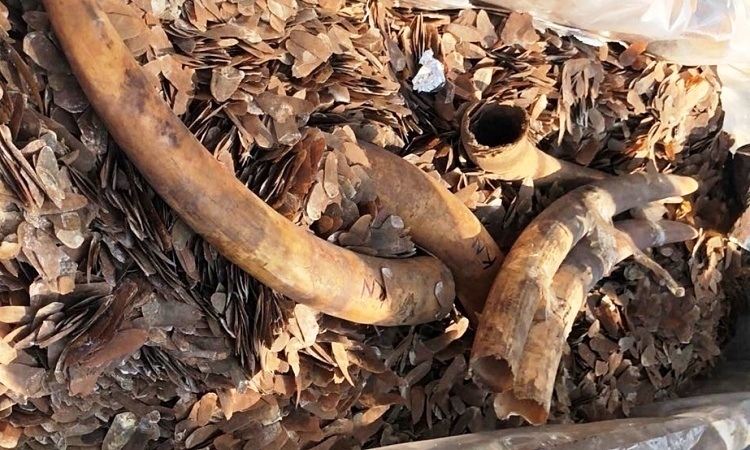
Photo Credits: VnExpress
Looking at the aforementioned facts, statistics, and incidents, it is clear that the pangolin creature is still widely targeted by poachers and traffickers, as well as being highly demanded by the traditional medicine industry and people who want to flaunt wealth. Let’s look at how all these human activities can lead to devastating consequences.
The Costs Of Poaching Pangolins
Illegal poaching is the leading cause of pangolins’ “vulnerable” and “threatened with extinction” status. If pangolins go extinct, the consequences will be devastating. They regulate insect populations, thus playing an extremely important ecological role. A single pangolin can consume as many as 70 million ants and termites per year. Besides, pangolins are soil caretakers and tenders. According to Simon Stuart, chair of the IUCN Species Survival Commission, pangolins save us millions of dollars in pest destruction each year. When they use their long claws to lap up ants and termites, they contribute to ecosystem sustainability by supplying the soil with air and spreading nutrients from one location to another. Therefore, if this animal goes extinct, there would be a cascading effect on the environment, the ecosystem, and the agricultural industry. Illegal poaching also takes a toll on natural diversity and humanity. We are blessed with magnificent flora and fauna, but we have lost many beautiful animals due to human activities. We cannot risk losing pangolins – an adorable species that deserves all the love in this world!
In brief, pangolins’ lives are at stake, and there has not been enough attention paid to this species. Thankfully, there is a hero that is willing to help this vulnerable creature. I am not talking about the heroes that you see in Marvel and DC films. Instead, I am putting a spotlight on a man that has dedicated his life to protecting and conserving pangolins. He is Nguyen Van Thai, a Vietnamese person who works hard to contribute to pangolin and wildlife conservation in his home country.
Nguyen Van Thai – Vietnamese Pangolins’ Guardian Angel
Working with pangolins is my greatest passion. It’s a joy to dedicate myself to the restoration and protection of this wild species
nguyen van thai
2021 Goldman Prize Winner
Nguyen Van Thai is one of six people in the world and the very first Vietnamese conservationist to be awarded the Goldman Environmental Prize, also known as the “Green Nobel” prize, in 2021. This award is a recognition of Nguyen’s perseverance, dedication, and tireless efforts in conserving and saving pangolins – one of the most heavily trafficked animals in the world.
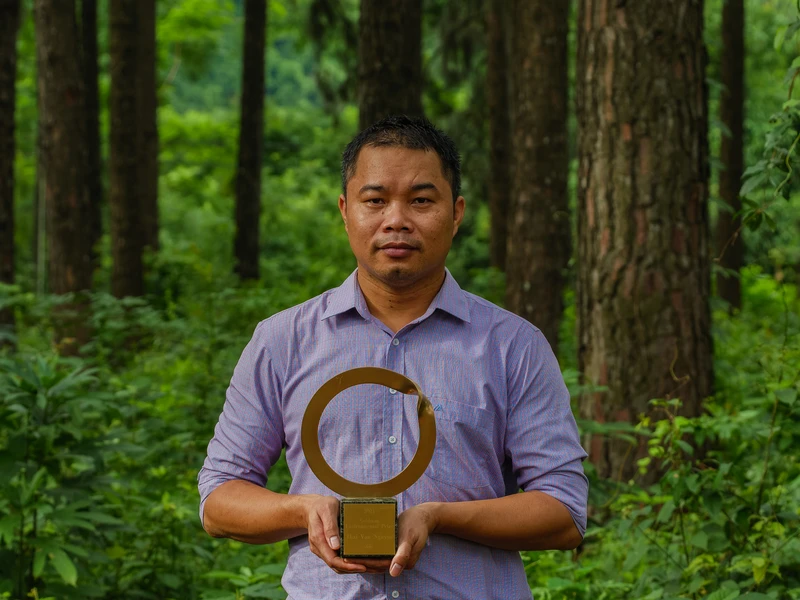
Photo Credits: Save Vietnam’s Wildlife
Path To Saving Pangolins
Growing up in Van Phuong – Ninh Binh, near Cuc Phuong national park, Thai has been deeply concerned about animals, and pangolins, in particular, being poached for traditional medicine and meat. He once witnessed the merciless killing of a mother pangolin and her baby near his home. “In front of me, I saw the hunters catch and cut open some pangolins in our village, ” Nguyen told VICE World News. ” It was really sad when I saw one baby pangolin with the mom. The mom put the baby on its belly and curled into a ball. But it could not protect itself and the baby from the poachers.” This distressing experience prompted Thai to pursue a career in forest ranging and pangolin conservation. In 2001, he enrolled at Vietnam National Forestry University to major in forest and environmental engineering. After graduating from university in 2005, he began working as a volunteer and coordinator of the Asian Pangolin Conservation Programme (APCP) – Vietnam’s first pangolin conservation programme in Vietnam. Having worked in this field for more than a decade, Thai has a deep understanding of pangolins and how illegal poaching works. He said the excessive trade and use of pangolin scales have been on the rise over the past ten years, explaining that the rapid economic development in Vietnam and China has caused a sensation among the mega-rich who crave “luxury” items and experiences. Due to rampant poaching, pangolins in Vietnam are driven to the brink of extinction. Acknowledging the pangolin species’ vulnerability, he dedicated his life to this precious creature, making significant contributions to national, regional, and global wildlife and pangolin conservation.
Thai’s Achievements
Nguyen is the true epitome of the quote “Allow your passion to become your purpose, and it will one day become your profession.” After spending two years as a volunteer rescuing pangolins, Thai became the manager of the Carnivore and Pangolin Conservation Programme (CCPCP). He started conducting studies and researches on protecting pangolins both in the wild and in captivity. In 2012, he was named one of 40 leading conservationists in the book “Wildlife Heroes” which was published in the United States. In 2014, Nguyen founded and became the director of Save Vietnam’s Wildlife – a national non-profit organisation that was founded to secure a bright future for Vietnamese wildlife. He then set out to stop the brutal poaching and killing of pangolins on a larger scale. His legacy began with outreach efforts: he wrote care manuals about rescued pangolins, published researches in peer-reviewed journals, as well as attending international workshops and seminars. Thanks to these opportunities, he was able to develop Vietnam’s first reintroduction and protocols for tracking pangolins. He also established a centre for Asian pangolin rehabilitation, the first of its kind in Vietnam, which aims at rehabilitating captive pangolins. He is the first Vietnamese to be elected Vice Chairman of the IUCN SSC Pangolin Specialist Group.
Vietnam’s first Carnivore and Pangolin Conservation Education Centre
Seeing that many Vietnamese are not fully aware that pangolins and wildlife, in general, are in grave danger, Thai decided to set up the first conservation education centre in Vietnam in Cuc Phuong National Park. It is made up of six large enclosures for carnivores and other enclosures which are specifically designed for pangolins that are not suitable for release. Through creative and interactive spaces, Thai and the centre offers the public an opportunity to learn about some of the rarest and most endangered species, such as Sunda pangolins and Owston’s civets, as well as the dangers that these animals are facing. The centre also serves as a meeting place for professional pangolin enthusiasts and conservationists work together to raise public awareness about this unique creature. Since its inception, more than 8000 students have joined. However, civilians are not only his target audience. Thai has been educating customs officers, border guards, and rangers on wildlife laws and how to properly take care of seized pangolins. His education centre will definitely attract more and more learners, encouraging more and more people to engage in protecting pangolins from extinction.
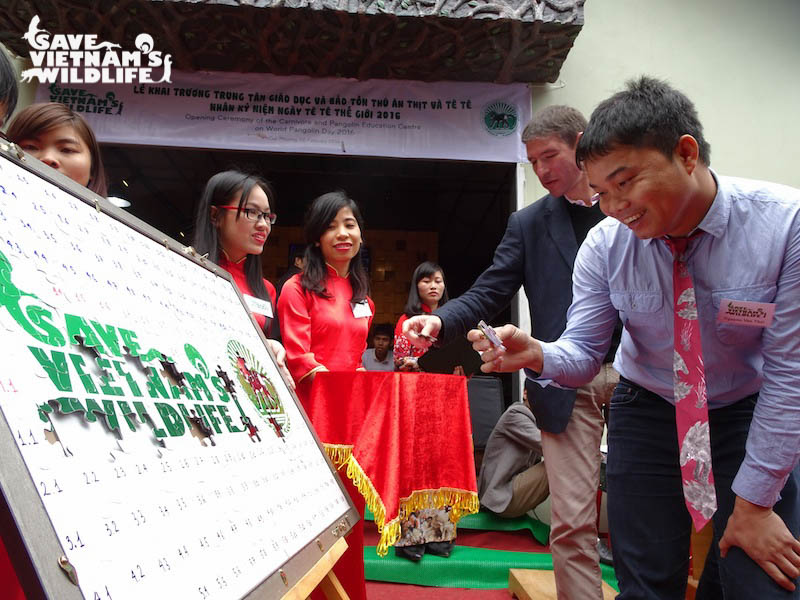
Photo Credits: Save Wildlife’s Vietnam
Vietnam’s first-ever Anti-poaching Team
Nguyen also established Vietnam’s first-ever anti-poaching unit. Since 2018, he has partnered with a local NGO and local authorities to train rangers in a variety of areas, including wildlife and pangolin conservation, animal identification, navigation skills, basic martial arts, and survival skills. On multiple occasions, the unit has cooperated with government rangers on multiple occasions to destroy illegal camps and wildlife traps, confiscate weapons, and arrest poachers across 235,000 acres of primary forest in Pu Mat National Park, Nghe An. They have destroyed 9701 pangolin traps, dismantled 775, confiscated 78 guns, and arrested 558 poachers between June 2018 and December 2020, resulting in a significant decrease in illegal poaching in the central province of Nghe An. Until now, approximately 2,500 law enforcement officers have been given training courses on pangolin conservation.
Under Thai’s leadership, the SVW team has rescued 1,540 pangolins, built 74 new cages, two veterinary hospitals and a 1,665-m2 semi-wild area. As a result, about 60% of the pangolin species have been released successfully.
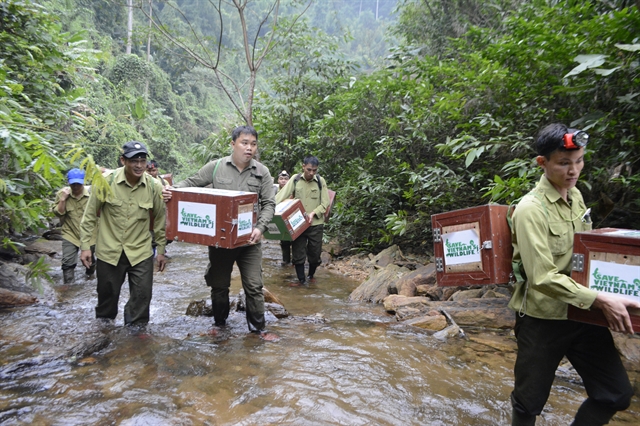
Photo Credits: Bao Nhan Dan
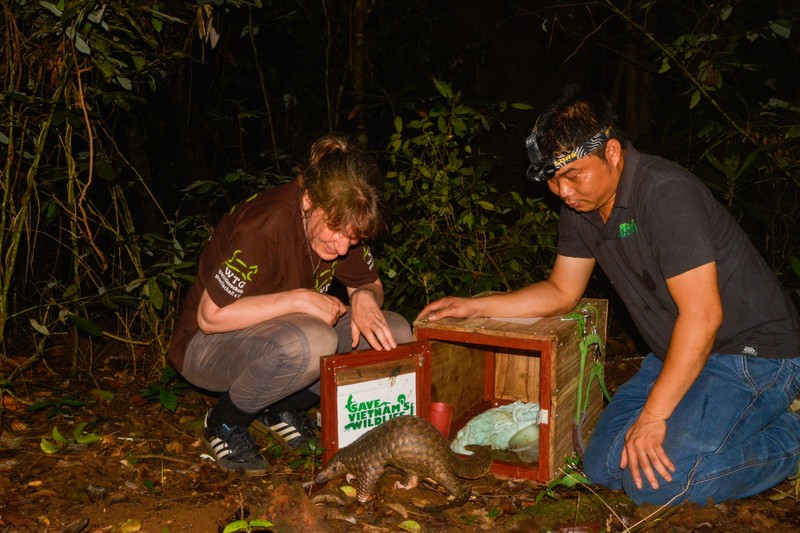
A Man With A Big Heart
When Thai heard that he was one of the prize winners this year, he was very surprised. He added that he did not have to submit an application to be considered because the organisers of the award secretly found candidates, evaluated their work, and announced the winners. A Vietnamese at heart, Thai said he was extremely proud to be the first Vietnamese wildlife protector to receive the award. However, he did not forget to give praise to fellow conservationists: “The award is not only for myself but for other conservationists in Vietnam. ” He hoped that this award would inspire to work with him and his team to save Vietnam’s wildlife, as well as build more trust among international partners and wildlife protection communities in Vietnam. The Goldman Environmental Prize is truly the biggest prize he has received so far.
His notion of “the biggest prize”, in fact, does not lie in its financial value. Its influence is the real game-changer. He believes that this prize can inspire others to contribute to pangolin conservation as well as raise public awareness of illegal poaching. When he appeared in the media, he was not happy because of public praise. Instead, he was delighted that his message of the importance of protecting pangolins is to be recorded, spread and would build real influence. After all, spreading positivity is what matters to him the most. What’s more, Thai planned to spend all the money that he got from the award, which was a total of $200,000 on conserving pangolins and wildlife in the future.
Thai’s Definition Of Magic
In a conversation about “magic” with Vietcetera, Thai recalled the very first stages of founding Save Vietnam’s Wildlife. At that time, he did not know how to recruit people, call for sponsorship, and if his little idea of a wildlife organisation could be long-lived. Nevertheless, he told himself to keep trying. His very first magical event was when he successfully called for funding after presenting his organisational model to a female senior in the conservation field. During the first six months, he chose not to receive his salary because he thought that funds should be allocated for more important aspects of the project.
His second magical gift is a friend of his who was fascinated by the idea of him seeking to save pangolins. Seeing that Thai was struggling with managing his work, the friend decided to help him call for additional sponsorship. “You cannot keep doing this without earning money, let me help you!” is what his friend said to him.
Thai’s last magic was when he started to hire two more people. Back then, his organisation only consisted of just three staff members. They had to do everything by themselves, from financial management, media strategy, event management to cleaning. With little resources, Thai and his colleagues had to learn and carry out experiments all by themselves. When they made mistakes, they had to try again. For that reason, he always appreciates teamwork. To him, magic is meeting people who believe in him and the organisation’s mission, especially when he has not achieved anything.
His teammates are also his sources of motivation and inspiration. The thought of giving up once invaded his mind, but it soon disappeared when he saw images of pangolins being freed and the smiles of his colleagues. There was one time when his anti-poaching group had to go very deep into the forest and wade through many torrents of water. Their food had to be packed with a great deal of salt, but it was still spoiled, forcing the team to pick forest leaves to temporarily ease hunger pains. For so many days, they had to live without homes and the internet. However, they managed to keep positive and care about their teammates. Seeing his colleagues’ devotion, Thai always feels like owing them a big thank you. He dare not to quit while his friends are still working enthusiastically. The press may call him a conservation hero, but to Thai, the real heroes are his comrades who are always by his side. He strongly believes that “teamwork makes the dream work”, that SVW’s achievement is a result of each member’s restless effort.
Thai’s Vision and Ambition
In addition to the current status of pangolins in mainland Vietnam, Nguyen pays close attention to global trends and how foreign countries take action to counter illegal pangolin trades. In 2019, he worked with the management authority of the Convention on International Trade in Endangered Species (CITES) to uplist all eight pangolin species to Appendix I, which means international trade in specimens of species that are most threatened with extinction. He is also looking forward to this year’s UN Biodiversity Conference in Kunming, China. Nguyen believes that this conference is a fundamental and changing step towards strengthening controls over illegal trafficking both in the context of COVID-19 and in the post-pandemic world.
Although the current reality of pangolin overexploitation is still gloomy, Thai believes that in ten to fifteen-year time, everything will be better. Young people are more conscious of wildlife protection and know how to live in harmony with nature. Their fervent support could encourage conservationists and protectors to continue working and saving nature as well as pangolins.
Thanks to Thai’s zeal for pangolin conservation, illegal poaching activities has decreased by 80% between 2014 and 2020. Considering this huge achievement, the government of Vietnam is now considering employing and expanding Thai’s models nationwide to tackle illegal trafficking and conserve pangolins.
As you can see, heroes are not only the ones that save humans. They are also individuals who advocate for animal rights and the protection of endangered species. I am sure that Thai’s actions and perseverance can inspire you and other people to learn more about pangolins and advocate for their rights. We all believe that he has helped push forward both national and international pangolin conservation. We hope that he will keep the flame burning in his heart and his profound love for this one-of-a-kind creature.
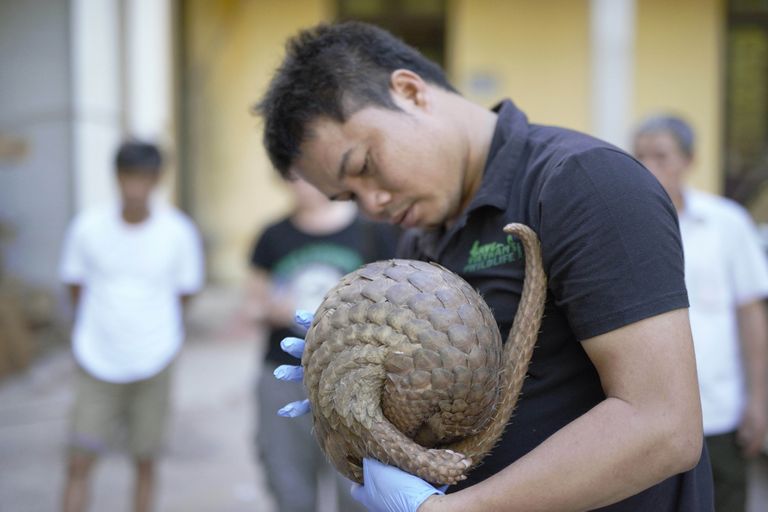
Photo Credits: Save Wildlife’s Vietnam
IVolunteer International is a 501(c)3 tech-nonprofit registered in the United States with operations worldwide. Using a location-based mobile application, we mobilize volunteers to take action in their local communities. Our vision is creating 7-billion volunteers. We are an internationally recognized nonprofit organization and is also a Civil Society Associated with the United Nations Department of Global Communications. Visit our profiles on Guidestar, Greatnonprofits, and FastForward.
